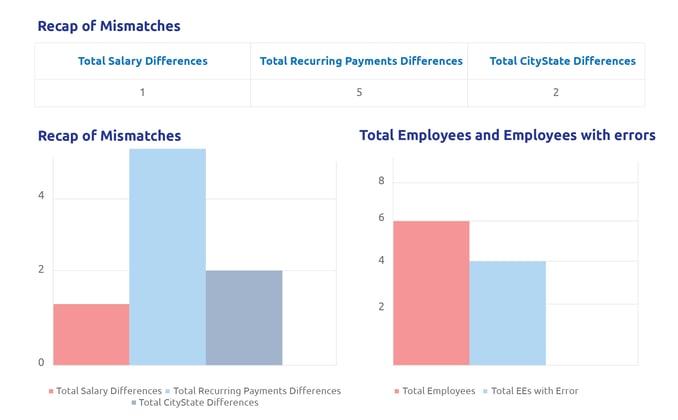Analyze data in SuccessFactors EC and ECP: An SAP Payroll analyst’s dashboard
By Paul Lamonica | 15 July 2021
With many SAP payroll customers moving to the cloud for their HR needs, it has become apparent that differences in Employee Central (EC) data and Employee Central Payroll (ECP) data or on-premise SAP payroll data, are causing payroll analysts additional time-consuming work when trying to determine the out-of-sync conditions between the two systems. While there are existing reporting capabilities in both EC and ECP, each of them on their own do not often satisfy the requirements analysts require. And what’s even worse, the reports are created separately, containing data from their respective systems, which then calls for extra steps by the analysts to marry the reports together to find where data is inconsistent.This is where a product like EPI-USE Labs’ Query Manager™ can provide payroll analysts with a method to report on both EC and ECP data together within one report. And, the report can easily highlight where data is different between the two systems.
To demonstrate Query Manager’s capabilities, let’s use an example that is most likely one that payroll analysts would find realistic in their data validation routine.
Prior to the next pay cycle to be executed, it’s imperative to check that the following data elements are in sync between EC and ECP:
- Annual Salary
- Recurring Payments and Deductions
- City and State of Residence (for tax calculation purposes)
Here is a report created through Query Manager that has retrieved data from EC and ECP in real time, and has quickly and easily highlighted differences with respect to these three types of payroll-related data:
Now that the data has been combined from the two systems and the differences identified, what’s next?
Although creating this report is the crucial first step, we can’t stop here. We need to get answers to the following three questions for the creation of this report to be beneficial:
- How can the report be available to the payroll analysts who need it?
- How can the data be refreshed so that the analysts are always looking at current results?
- How can the results be displayed in different ways, providing the payroll analyst with different views into the results?
EPI-USE Labs has also solved these issues with the use of our Query Manager Analytics Connector, and with a little help from one of the many visualization tools that exist, such as Microsoft’s Power BI, Tableau, or SAP Analytics Cloud. While any of the visualization tools will work with the Query Manager Analytics Connector, in this blog we will be using Microsoft Power BI as our chosen tool.
EPI-USE Labs’ Analytics Connector allows the results of your Query Manager query to be available to the visualization tool, where the data can be turned into a variety of output types that makes the analysis of the data very user-friendly. And maybe one of the most important points of all: the whole process can be automated and scheduled, so there is no manual intervention within the process.
Here is a typical process flow:
- Schedule the Query Manager query to be run automatically every day at 7:00 a.m. This functionality exists directly within Query Manager. Data has now been combined from EC and ECP, and the discrepancies have been identified.
- Schedule your Power BI refresh to kick off automatically every day at 7:30 a.m. This is standard functionality with Power BI and is very easy to set up. Power BI now recognizes the most current results obtained from the Query Manager query, using the Query Manager Analytics Connector as the gateway between Power BI and the Query Manager query results.
It’s that simple. Those two easy steps have now allowed the payroll analysts who need to view and resolve the data discrepancies to see the most current results within Power BI. Also, they can see the results in a variety of ways that makes it very easy to know the next steps to take.
Here are just a few of the many ways to display the data differences within Power BI.
First, separate reports can be created that show the discrepancies for each of the payroll-affecting areas being interrogated. Naturally, each of these reports can be downloaded into something like a Microsoft Excel® spreadsheet, if the user prefers to use the data in that way:
Next, the results can be displayed in a summarized fashion.
The first two reports show the number of differences for each of the areas being checked, while the third report simply shows the total number of employees on the reports, and the number of employees who have at least one discrepancy.
The great part of the detail reports and the summarized reports is that they are showing the discrepancies that exist within the EC and ECP systems using constantly refreshed data. And, the reports were created automatically with no manual intervention.
Whenever the same type of data exists in more than one system, the possibility for data discrepancies can always occur. For years, having automated processes that can report and identify these data differences has always been a challenge. And the distribution and refreshing of those reports with current results has never been a smooth process. But now, with the use of EPI-USE Labs’ Query Manager and Query Manager Analytics Connector, along with the use of one of the many visualization tools, the completely automated process of getting this vital information into the hands of the users who need them has been significantly simplified.
Paul Lamonica
Paul is a Senior Solutions Architect, responsible for training of all EPI-USE Labs HCM products. He also works on new customer demos and national webinars hosted by EPI-USE Labs.




